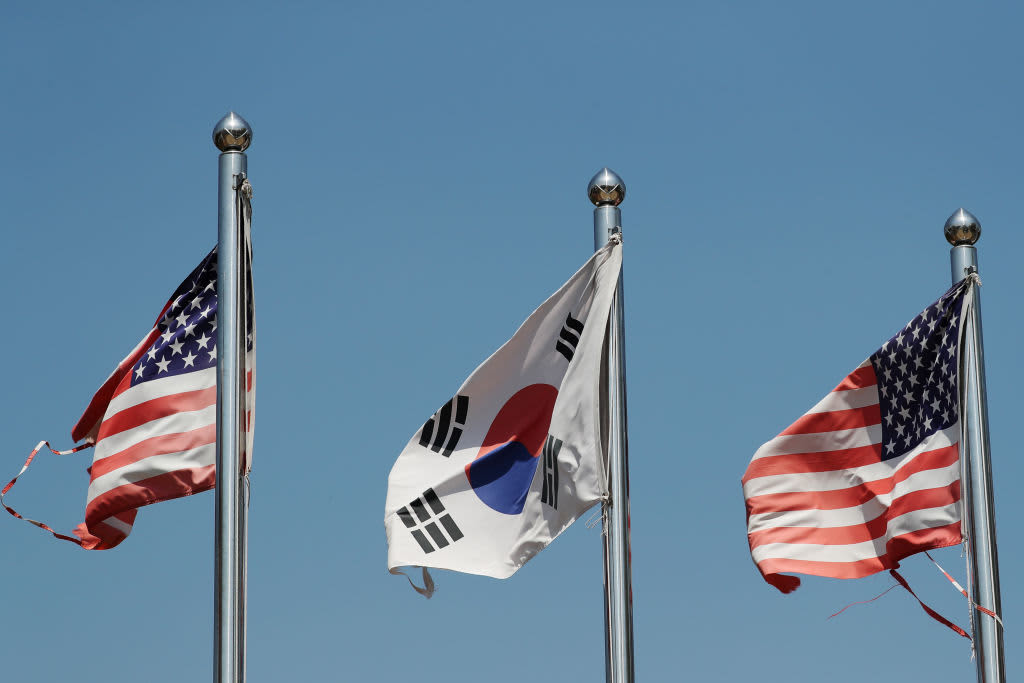South Korean President Moon Jae-in would be seeking U.S. President Joe Biden’s help on securing Covid-19 vaccines when the leaders meet in Washington on Friday, according to one foreign policy expert.
“I think the South Koreans have put a very big emphasis on vaccine diplomacy as being the big deliverable of this summit,” Victor Cha, a professor and vice dean at Georgetown University, told CNBC’s “Street Signs Asia” on Friday.
The meeting with Moon will be Biden’s second in-person summit with a country leader. Last month, the U.S. president met Japanese Prime Minister Yoshihide Suga in Washington.
Domestic pressure has mounted on Moon to push for faster deliveries of vaccines as rising Covid cases have forced authorities to extend social-distancing measures multiple times. Moon has pledged to reach “herd immunity” by November, but a global shortage of vaccines threatens his pledge. Herd immunity happens when enough people in the population are vaccinated or infected, and the disease can no longer spread wildly.
Around 7.34% of the South Korean population has received at least one dose of the Covid-19 vaccine, according to data by the Korea Disease Control and Prevention Agency.
South Korea on Friday approved Moderna‘s Covid vaccine — the fourth approval after giving the green light to those developed by AstraZeneca, Pfizer–BioNTech and Johnson & Johnson, reported Reuters.
The shortage of vaccines comes as infections rise over the past month. South Korean authorities on Friday extended social-distancing measures for another three weeks given that daily cases are still high.
The country has reported a total of more than 134,600 confirmed cases of Covid-19 since the start of last year, with 1,922 deaths, according to the latest official data.
North Korea takes a backseat
The urgency to secure supplies of Covid-19 vaccines would likely overshadow any efforts by Moon to revive talks on North Korea.
“I think President Moon obviously is more interested in moving quickly on North Korea given that he has less than a year left in his time in office,” said Cha. The professor is an American who was director of Asian affairs at the White House National Security Council from 2004 to 2007, and is senior vice president and Korea Chair at think tank Center for Strategic and International Studies.
He said Biden is “not against” diplomacy with North Korea, but the administration may have a lot on its plate including tensions in the Middle East and the strategic competition with China.
Furthermore, North Korea doesn’t appear keen on dialogue right now with the country remaining in lockdown due to the pandemic, said Cha.
Still, both Moon and Biden are likely to signal that they’re in “complete alignment” on issues surrounding North Korea, Cha added.
Ahn Ho-young, former South Korean ambassador to the U.S. from 2013 to 2017, agreed the summit could cover issues other than North Korea.
Ahn told CNBC’s “Capital Connection” on Friday that during his time in Washington, leaders from both the U.S. and South Korea spent much of time discussing North Korea-related issues.
“I think this summit meeting is rather unique … because this time I think. we expect our leaders to discuss more, spend more of their time on such issues like vaccines or batteries or semiconductors,” he said.
“There are so many things we could be doing together between Korea and the United States.”
